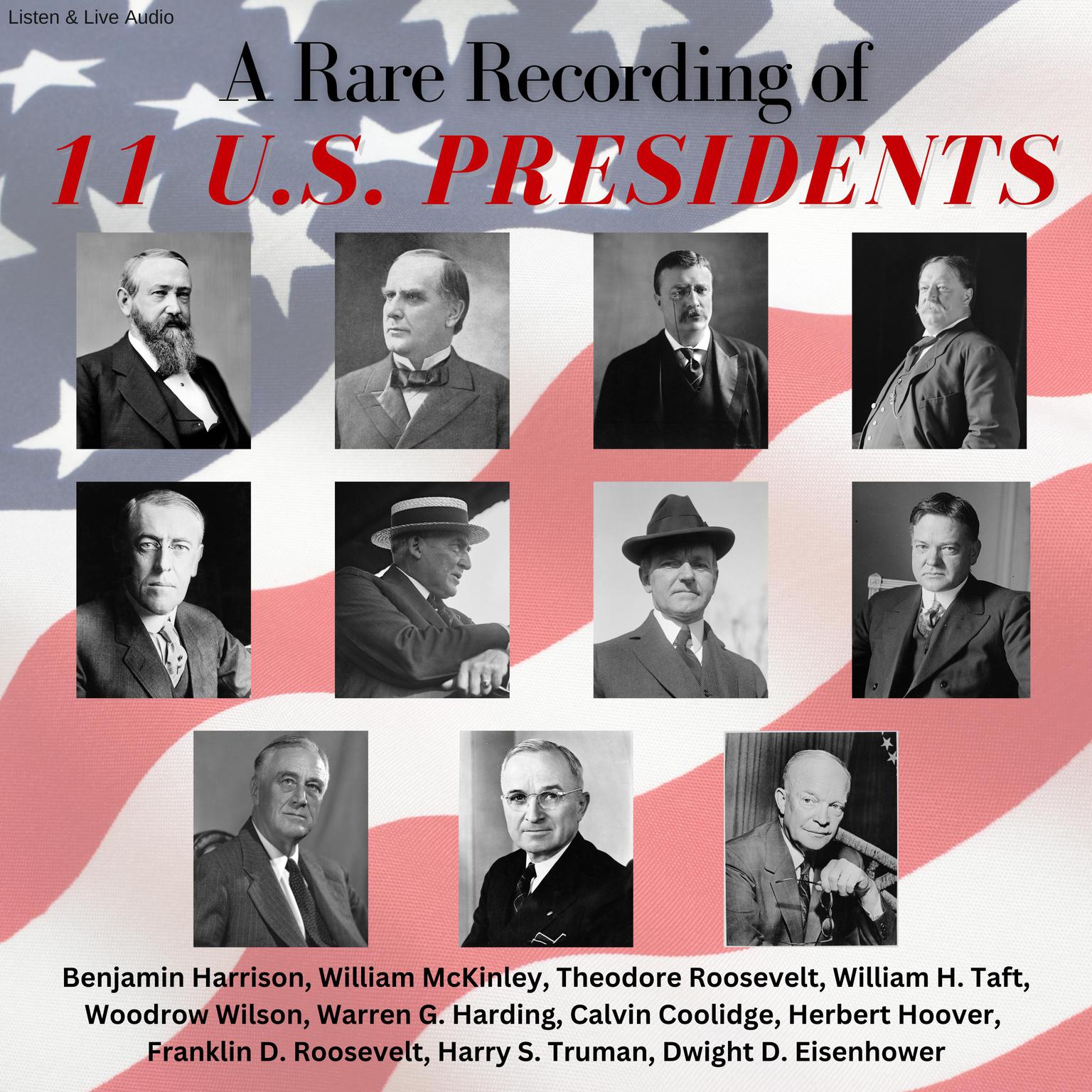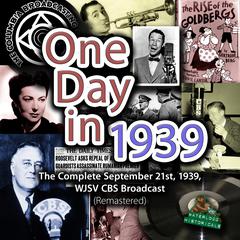 Play Audiobook Sample
Play Audiobook Sample
A Rare Recording of 11 US Presidents Audiobook
 Play Audiobook Sample
Play Audiobook Sample
Quick Stats About this Audiobook
Total Audiobook Chapters:
Longest Chapter Length:
Shortest Chapter Length:
Average Chapter Length:
Audiobooks by this Author:
Publisher Description
Hear live recordings of 11 US Presidents, including Benjamin Harrison (23rd), William McKinley (25th), Theodore Roosevelt (26th), William H. Taft (27th), Woodrow Wilson (28th), Warren G. Harding (29th), Calvin Coolidge (30th), Herbert Hoover (31st), Franklin D. Roosevelt (32nd), Harry S. Truman (34th), Dwight D. Eisenhower (34th). Benjamin Harrison (August 20, 1833 - March 13, 1901) was an American lawyer and politician who served as the 23rd president of the United States from 1889 to 1893. He was a grandson of the ninth president, William Henry Harrison, and a great-grandson of Benjamin Harrison V, a founding father who signed the United States Declaration of Independence. William McKinley (January 29, 1843 - September 14, 1901) was the 25th president of the United States, serving from 1897 until his assassination in 1901. He was president during the Spanish-American War of 1898, raised protective tariffs to boost American industry, and rejected the expansionary monetary policy of free silver, keeping the nation on the gold standard. Theodore Roosevelt (October 27, 1858 - January 6, 1919) was an American politician, statesman, conservationist, naturalist, historian, and writer who served as the 26th president of the United States from 1901 to 1909. He previously served as the 25th vice president under William McKinley from March to September 1901, and as the 33rd governor of New York from 1899 to 1900. William H. Taft (September 15, 1857 - March 8, 1930) was the 27th president of the United States (1909-1913) and the tenth chief justice of the United States (1921-1930), the only person to have held both offices. Taft was elected president in 1908, the chosen successor of Theodore Roosevelt, but was defeated for reelection by Woodrow Wilson in 1912 after Roosevelt split the Republican vote by running as a third-party candidate. In 1921, President Warren G. Harding appointed Taft to be chief justice, a position he held until a month before his death. Woodrow Wilson (December 28, 1856 - February 3, 1924) was an American politician and academic who served as the 28th president of the United States from 1913 to 1921. A member of the Democratic Party, Wilson served as the president of Princeton University and as the governor of New Jersey before winning the 1912 presidential election. As President, Wilson changed the nation's economic policies and led the United States into World War I in 1917. He was the leading architect of the League of Nations, and his progressive stance on foreign policy came to be known as Wilsonianism. Warren G. Harding (November 2, 1865 - August 2, 1923) was the 29th president of the United States, serving from 1921 until his death in 1923. A member of the Republican Party, he was one of the most popular U.S. presidents to that point. Calvin Coolidge (July 4, 1872 - January 5, 1933) was an American lawyer and politician who served as the 30th president of the United States from 1923 to 1929. A Republican lawyer from New England, born in Vermont, Coolidge worked his way up the ladder of Massachusetts politics, eventually becoming governor of Massachusetts. His response to the Boston Police Strike of 1919 thrust him into the national spotlight and gave him a reputation as a man of decisive action. The next year, he was elected the 29th vice president of the United States, and he succeeded to the presidency upon the sudden death of Warren G. Harding in 1923. Herbert Hoover (August 10, 1874 - October 20, 1964) was an American politician, businessman, and engineer who served as the 31st president of the United States from 1929 to 1933 and a member of the Republican Party, holding office during the onset of the Great Depression. Before serving as president, Hoover served as the director of the U.S. Food Administration, and served as the third U.S. secretary of commerce. Franklin D. Roosevelt (January 30, 1882 - April 12, 1945) was an American politician and attorney who served as the 32nd president of the United States from 1933 until his death in 1945. A member of the Democratic Party, he won a record four presidential elections and became a central figure in world events during the first half of the 20th century. Roosevelt directed the federal government during most of the Great Depression, implementing his New Deal domestic agenda in response to the worst economic crisis in U.S. history. As a dominant leader of his party, he built the New Deal Coalition, which defined modern liberalism in the United States throughout the middle third of the 20th century. His third and fourth terms were dominated by the Second World War, which ended shortly after he died in office. Harry S. Truman (May 8, 1884 - December 26, 1972) was the 33rd president of the United States, serving from 1945 to 1953. A lifetime member of the Democratic Party, he previously served as the 34th vice president from January to April 1945 under Franklin Roosevelt, and as a United States Senator from Missouri from 1935 to January 1945. Having assumed the presidency after Roosevelt's death, Truman implemented the Marshall Plan to rebuild the economy of Western Europe and established both the Truman Doctrine and NATO to contain the expansion of communism. Dwight D. Eisenhower (October 14, 1890 - March 28, 1969) was an American military officer and statesman who served as the 34th president of the United States from 1953 to 1961. During World War II, he served as Supreme Commander of the Allied Expeditionary Force in Europe, and achieved the rare five-star rank of General of the Army. He was responsible for planning and supervising the invasion of North Africa in Operation Torch in 1942-1943 and the successful invasion of Normandy in 1944-1945 from the Western Front.
Download and start listening now!
A Rare Recording of 11 US Presidents Listener Reviews
Be the first to write a review about this audiobook!
About the Authors
Theodore Roosevelt (1858–1919) was the twenty-sixth president of the United States. He is noted for his exuberant personality, range of interests and achievements, leadership of the Progressive movement, and “cowboy” image. He was a leader of the Republican Party and founder of the short-lived Progressive Party of 1912. Before becoming president, he held offices at the municipal, state, and federal level of government. Roosevelt’s achievements as a naturalist, explorer, hunter, author, and soldier are as much a part of his fame as any office he held as a politician.
Calvin Coolidge (1872-1933) was an American lawyer and politician, who became the thirtieth president of the United States in 1923 and served until 1929. He gained a reputation as a small-government conservative and also as a man who said very little and had a rather dry sense of humor.
Xe Sands has more than a decade of experience bringing stories to life through narration, performance, and visual art, including recordings of the Nightwalkers series from Jaquelyn Frank. She has received several honors, including AudioFile Earphones Awards and a coveted Audie Award, and she was named Favorite Debut Romance Narrator of 2011 in the Romance Audiobooks poll.
About Theodore Roosevelt
Lee Samuels (SAG-AFTRA) has lent his deep, “whiskey-smooth” voice to over 200 romance audiobooks; from small-town to suspense, and rom-coms to erotica. With a background in theatre, Lee’s audiobook career began in New York City when his roommate, then working as an audiobook engineer at Recorded Books, offered to help him record a few auditions for her friends’ then-new studio (Brick Shop Audio) in 2011. In his other life, he’s also a New York Times-published writer and author.




